Related Research Articles
Espionage, spying, or intelligence gathering is the act of obtaining secret or confidential information (intelligence). A person who commits espionage is called an espionage agent or spy. Any individual or spy ring, in the service of a government, company, criminal organization, or independent operation, can commit espionage. The practice is clandestine, as it is by definition unwelcome. In some circumstances, it may be a legal tool of law enforcement and in others, it may be illegal and punishable by law.
A covert listening device, more commonly known as a bug or a wire, is usually a combination of a miniature radio transmitter with a microphone. The use of bugs, called bugging, or wiretapping is a common technique in surveillance, espionage and police investigations.
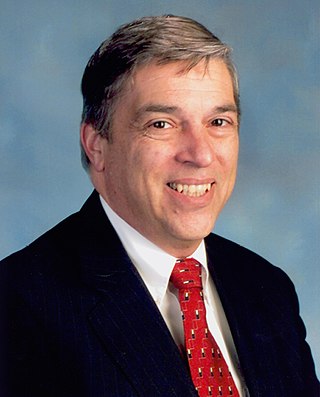
Robert Philip Hanssen was an American Federal Bureau of Investigation (FBI) agent who spied for Soviet and Russian intelligence services against the United States from 1979 to 2001. His espionage was described by the Department of Justice as "possibly the worst intelligence disaster in U.S. history".
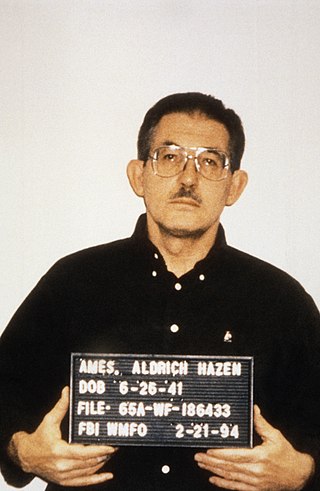
Aldrich Hazen "Rick" Ames is a former CIA counterintelligence officer who was convicted of espionage on behalf of the Soviet Union and Russia in 1994. He is serving a life sentence, without the possibility of parole, in the Federal Correctional Institution in Terre Haute, Indiana. Ames was known to have compromised more highly classified CIA assets than any other officer until Robert Hanssen, who was arrested seven years later in 2001.
Earl Edwin Pitts is a former FBI special agent who was convicted of espionage for selling information to Soviet and Russian intelligence services.
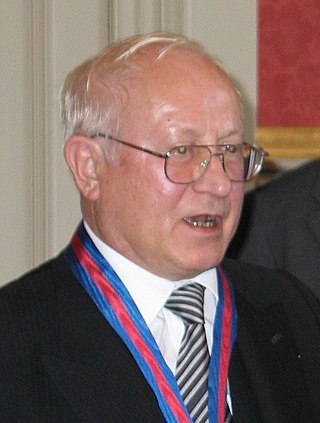
Oleg Antonovich Gordievsky, CMG is a former colonel of the KGB who became KGB resident-designate (rezident) and bureau chief in London, and was a double agent, providing information to the British Secret Intelligence Service (MI6) from 1974 to 1985. After being recalled to Moscow under suspicion, he was exfiltrated from the Soviet Union in July 1985 under a plan code-named Operation Pimlico. The Soviet Union subsequently sentenced him to death in absentia.
Larry Wu-tai Chin was a Chinese Communist spy who worked for the United States Government for 37 years (1944–1981), including positions at the U.S. Army and the CIA, while secretly being a mole for the Communist Party's intelligence apparatus from the very beginning. He kept passing classified documents and secret information to the People's Republic of China even after his retirement, until he was finally exposed in 1985.
Amerasia was a journal of Far Eastern affairs best known for the 1940s "Amerasia Affair" in which several of its staff and their contacts were suspected of espionage and charged with unauthorized possession of government documents.
Helen Barrett Tenney worked for the Comintern apparatus in the 1930s and funnelled information to the Soviet Union on behalf of the Spanish Communists where she learned espionage tradecraft.

Harold James Nicholson is a former Central Intelligence Agency (CIA) officer who was twice convicted of spying for Russia's Foreign Intelligence Service (SVR).
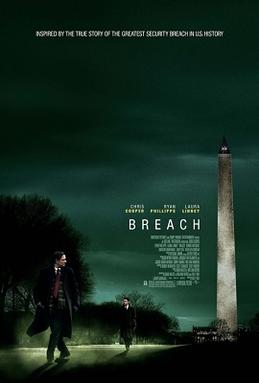
Breach is a 2007 American spy thriller film directed by Billy Ray, who wrote the screenplay with Adam Mazer and William Rotko. The film is based on the true story of Robert Hanssen, an FBI agent convicted of spying for the Soviet Union and later Russia for more than two decades. It stars Chris Cooper as Hanssen and Ryan Phillippe as Eric O'Neill, the FBI Investigator who helped bring about his downfall. The film received generally positive reviews and grossed $41 million on a $23 million budget.
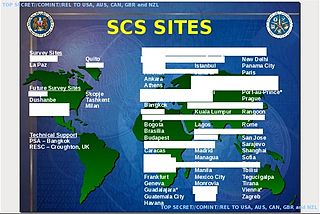
The Special Collection Service (SCS), codenamed F6, is a highly classified joint U.S. Central Intelligence Agency–National Security Agency program charged with inserting eavesdropping equipment in difficult-to-reach places, such as foreign embassies, communications centers, and foreign government installations. Established in the late 1970s and headquartered in Beltsville, Maryland, the SCS has been involved in operations ranging from the Cold War to the Global War on Terrorism.
Boris Nikolaevich Yuzhin is a former Soviet spy. He was a mole in the KGB, spying for the Federal Bureau of Investigation in the 1970s and 1980s before being caught and imprisoned.
Clandestine HUMINT asset recruiting refers to the recruitment of human agents, commonly known as spies, who work for a foreign government, or within a host country's government or other target of intelligence interest for the gathering of human intelligence. The work of detecting and "doubling" spies who betray their oaths to work on behalf of a foreign intelligence agency is an important part of counterintelligence.
The American media referred to 1985 as the Year of the Spy because law enforcement arrested many foreign spies operating on American soil. However, the preceding year, 1984, actually had more arrests for espionage in the United States.
Fedora was the codename for Aleksey Kulak (1923–1983), a KGB-agent who infiltrated the United Nations during the Cold War. One afternoon in March 1962, Kulak walked into the FBI's NYC field office in broad daylight and offered his services. Kulak told his American handlers there was a KGB mole working at the FBI, leading to a decades-long mole hunt that seriously disrupted the agency. Although the FBI's official position for a few years in the late 1970s and early 1980s was that Fedora had been Kremlin-loyal all along, that position was reversed to its original one in the mid 1980s, and Fedora is now said by the Bureau to have been spying faithfully for the FBI from when he "walked in" in March 1962 until he returned to Moscow for good in 1977.
Brian Kelley was an American Central Intelligence Agency (CIA) counterintelligence officer. He was investigated by the CIA and FBI as a suspected KGB mole during the 1990s, before FBI agent Robert Hanssen was identified as the actual mole and arrested in 2001. Having been suspended during the investigation, Kelley was reinstated by the CIA and later received the Distinguished Career Intelligence Medal for his service.

In 1995 it was revealed that the Central Intelligence Agency had delivered intelligence reports to the U.S. government between 1986 and 1994 which were based on agent reporting from confirmed or suspected Soviet operatives. From 1985 to his arrest in February 1994, CIA officer and KGB mole Aldrich Ames compromised Agency sources and operations in the Soviet Union and Eastern Europe, leading to the arrest of many CIA agents and the execution of at least ten of them. This allowed the KGB to replace the CIA agents with its own operatives or to force them to cooperate, and the double agents then funneled a mixture of disinformation and true material to U.S. intelligence. Although the CIA's Soviet-East European (SE) and Central Eurasian divisions knew or suspected the sources to be Soviet double agents, they nevertheless disseminated this "feed" material within the government. Some of these intelligence reports even reached Presidents Ronald Reagan and George H. W. Bush, as well as President-elect Bill Clinton.

Operation Monopoly was a covert plan by the United States Federal Bureau of Investigation (FBI) to build a tunnel underneath the Soviet Embassy in Washington, D.C., to gather secret intelligence in effect from 1977 until its public discovery in 2001.
References
- 1 2 Cherkashin, Victor; Feifer, Gregory (January 2005). Spy Handler: Memoir of a KGB Officer . Basic Books. ISBN 0-465-00968-9.
- 1 2 3 4 5 6 7 Wise, David; Espionage, And (May 13, 1990). "The Felix Bloch Affair". The New York Times . Retrieved 2008-04-05.
- ↑ Stategate. (State Department and Felix Bloch investigation) - National Review | Encyclopedia.com
- ↑ US Weighs Dismissing Bloch But Has Evidence Problem, The New York Times, 30 September 1989
- ↑ Spy Like Us? Archived 2016-01-20 at the Wayback Machine Indy, 7 March 2001
- ↑ "Independent Weekly: Spy Like Us?". Archived from the original on 2016-01-20. Retrieved 2007-11-29.
- ↑ Veteran counterspy Brian Kelley, who broke Moscow code and was hounded by FBI, dies at 68 [ dead link ] The Washington Post. September 20, 2011
- ↑ Independent Weekly: After the molehunts